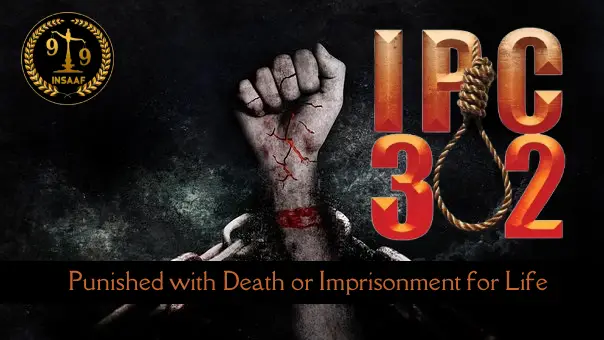

Online Legal Advice from Insaaf99® Online Lawyer Consultation in India


Online Legal Advice from Insaaf99® Online Lawyer Consultation in India

The effects of crime extend far beyond the individuals directly involved. It breaks confidence, makes us feel less secure, and shatters the ties that hold communities together. The emotional toll it takes is also significant, causing trauma and anxiety. In high-crime areas, it is more difficult for children to obtain a decent education and for people to escape poverty. Criminal law in India is based on the Indian Penal Code (IPC). The IPC details offenses, categories, and sanctions. It includes all forms of violent crime, including robbery, fraud, murder, and rape. Crime, law enforcement, and the legal system all have a structure provided by the IPC.
Murder is treated very seriously under Section 302 IPC. As the unlawful and premeditated killing of another human being, murder ranks among the gravest of crimes. Strict penalties for murder are outlined in Section 302, coupled with a comprehensive explanation of the crime's core elements. Section 302 ensures justice in cases of unlawful killing by providing guidance to law enforcement, legal professionals, and the judicial system as they determine guilt or innocence and inflict appropriate punishments. The key concepts of guilt and punishment in the Indian legal system are emphasized in Section 302 IPC, making familiarity with it essential for lawyers.
Section 302 IPC meticulously outlines the offense of murder, incorporating pivotal elements central to its legal interpretation. This provision mandates an illicit act executed with a palpable intention to cause death on the part of the accused. This rule says that if someone intentionally hurts another person and that person dies because of it, the law treats it as murder. To prove its murder, there must be evidence that the person meant to cause harm and knew their actions could lead to death.
A successful conviction demands the substantiation of both the "men's rea" (culpable mindset) and the "actus reus" (culpable conduct). Both capital punishment and life imprisonment stand as potential penalties for individuals found guilty under Section 302 IPC. A comprehensive evaluation of the accused's intent, behavior, and contextual intricacies forms an imperative foundation in murder trials to ascertain a verdict that aligns with justice. It's important in murder cases for judges to carefully look at what the person meant to do, what they did, and the situation around it to make a fair decision.
IPC 302 considers murder as a serious crime and there are severe punishments outlined in Section 302 IPC. Life in prison to the death sentence is possible for those convicted under this law. The type of offense, criminal intent, circumstance and the case play a crucial role in deciding the severity of punishment.
Section 302 penalty depends on several criteria. The offender's motive, murder's brutality, and aggravating or mitigating circumstances are crucial. Multiple murders or great cruelty can increase punishments, but provocation or mental illness can reduce them. The offender's criminal past, threat to society, and crime's impact also matter. Outrage and social environment might also impact the court's decision.
Judges carefully examine these elements to decide a penalty that matches the offense's severity and the offender's guilt. This careful balance promotes fairness, accountability, and deterrence. The court's ultimate purpose is to impose an equitable and proportionate penalty that upholds the law and recognizes each case's complexity.

Crimes can be labeled as either "bailable" or "non-bailable" based on their level of severity and the associated threat to society. Offenses that are "bailable" are considered less severe and typically allow for temporary release on bail. The accused must ask for bail for more serious crimes like murder, with the court's final decision on the matter.
Murder, which is covered by Section 302 IPC, is a very heinous crime for which there is no provision for bail. However, bail is set based on the individual circumstances, the available evidence and the degree of danger posed to the society. As a rule, murder is an inherently non-bailable offense, but in some cases, the court may decide to consider granting bail for the sake of maintaining public safety and justice.
Grasping the essence of Section 302 IPC holds pivotal significance for society, justice, and legal norms. This clause exemplifies murder and the principles of a fair and successful criminal justice system.
A comprehensive understanding of Section 302 is essential for individuals, legal experts, and the community at large to differentiate between intentional and unintended fatalities. Moreover, the section underscores the significance of a well-balanced legal procedure that factors in intent, circumstances, and mental state when evaluating culpability and penalties.
Discussions over Section 302 reflect a broader concern for a fair and effective legal system that serves to preserve the rule of law, protect individual liberties, and deter serious wrongdoing. Overall, the ideas embodied in Section 302 have implications beyond the bounds of the law, calling for a more equitable social fabric supported by a firm dedication to justice and responsibility.
Insaaf99, an online legal consultation firm, plays a pivotal role in cases involving Section 302 of the IPC. Leveraging its expertise, Insaaf99 provides specialized guidance to individuals, legal professionals, and families affected by such grave offenses. The firm's experienced lawyers offer insights on navigating the complexities of murder charges, outlining the legal nuances and potential consequences. Insaaf99 facilitates informed decision-making, aiding clients in understanding their rights, responsibilities, and available legal strategies. Through virtual consultations, personalized advice, and comprehensive legal support, Insaaf99 empowers clients to approach Section 302 cases with clarity, ensuring fair representation and a thorough grasp of the legal proceedings.
Also Read.